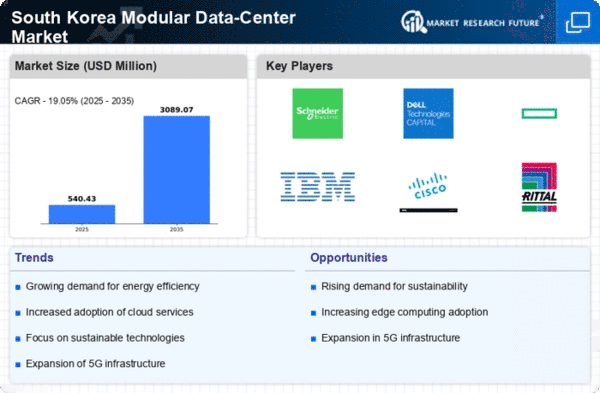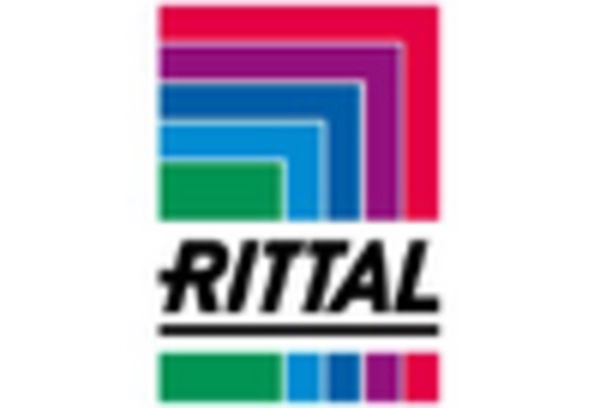Rising Demand for Data Processing
The modular data-center market in South Korea experiences a notable surge in demand for efficient data processing solutions. As businesses increasingly rely on data analytics and real-time processing, the need for modular data centers becomes apparent. These facilities offer scalability and flexibility, allowing organizations to expand their operations without significant upfront investments. In 2025, the market is projected to grow by approximately 15%, driven by the need for rapid data processing capabilities. This trend indicates a shift towards modular solutions that can be deployed quickly and efficiently, catering to the evolving needs of various industries. The modular data-center market is thus positioned to capitalize on this growing demand, providing tailored solutions that meet the specific requirements of businesses across sectors.
Government Initiatives and Support
The South Korean government actively promotes the development of the modular data-center market through various initiatives and support programs. These efforts aim to enhance the country's technological infrastructure and attract foreign investments. In 2025, government funding for digital infrastructure is expected to reach $1 billion, with a significant portion allocated to modular data centers. This financial backing encourages innovation and the adoption of advanced technologies within the modular data-center market. Furthermore, regulatory frameworks are being established to facilitate the growth of these facilities, ensuring compliance with environmental standards and energy efficiency. As a result, the modular data-center market is likely to benefit from increased government support, fostering a conducive environment for growth and development.
Shift Towards Sustainable Practices
Sustainability emerges as a critical driver for the modular data-center market in South Korea. With growing awareness of environmental issues, businesses are increasingly seeking eco-friendly solutions. Modular data centers, designed for energy efficiency and reduced carbon footprints, align with these sustainability goals. In 2025, it is estimated that 30% of new data centers will adopt modular designs focused on sustainability. This shift not only meets regulatory requirements but also enhances corporate social responsibility initiatives. The modular data-center market is thus adapting to these demands, offering solutions that minimize energy consumption and promote renewable energy sources. As sustainability becomes a priority, the market is likely to witness a transformation in design and operational practices.
Technological Advancements in Infrastructure
Technological advancements play a pivotal role in shaping the modular data-center market in South Korea. Innovations in cooling systems, power management, and modular designs enhance the efficiency and performance of these facilities. In 2025, the market is projected to benefit from a 20% increase in the adoption of advanced technologies, such as AI-driven management systems and IoT integration. These advancements enable real-time monitoring and optimization of data center operations, leading to improved reliability and reduced operational costs. The modular data-center market is thus positioned to leverage these technological developments, providing cutting-edge solutions that meet the demands of modern businesses. As technology continues to evolve, the market is likely to experience significant growth and transformation.
Increased Focus on Disaster Recovery Solutions
The need for robust disaster recovery solutions drives growth in the modular data-center market in South Korea. As businesses recognize the importance of data protection and continuity, modular data centers offer flexible and resilient options for disaster recovery. In 2025, it is anticipated that 25% of organizations will invest in modular solutions specifically for disaster recovery purposes. These facilities provide rapid deployment capabilities and redundancy, ensuring that critical data remains accessible during emergencies. The modular data-center market is thus responding to this demand by offering tailored solutions that enhance business resilience. As organizations prioritize data security and recovery, the market is likely to see a sustained increase in interest and investment.
















